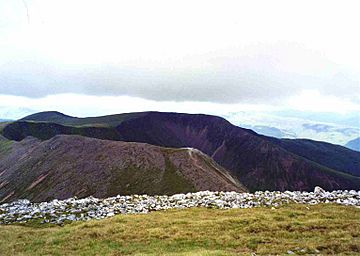Mullach nan Coirean facts for kids
Quick facts for kids Mullach nan Coirean |
|
|---|---|

Mullach nan Coirean seen from Stob Bàn across Coire Dearg.
|
|
| Highest point | |
| Elevation | 939 m (3,081 ft) |
| Prominence | 93 m (305 ft) |
| Parent peak | Stob Bàn |
| Listing | Munro |
| Naming | |
| English translation | Summit of the Corries |
| Language of name | Scottish Gaelic |
| Pronunciation | English approximation: moo-LƏKH-nən-KOR-yən |
| Geography | |
| Location | Highland, Scotland |
| Parent range | Mamores |
| OS grid | NN122662 |
| Topo map | OS Landranger 41, OS Explorers 392 |
| Listed summits of Mullach nan Coirean | ||||
| Name | Grid ref | Height | Status | |
|---|---|---|---|---|
| South East Top | NN131654 | 917 m (3008 ft) | Munro Top | |
Mullach nan Coirean is a mountain in Scotland. It is part of the Mamores mountain range. This mountain stands 939 meters (about 3,081 feet) tall. It is located about eight kilometers north-west of a town called Kinlochleven.
Mullach nan Coirean is the most western of the ten Munros in the Mamores. A Munro is a Scottish mountain that is over 3,000 feet (914.4 meters) high. Mullach nan Coirean is connected to another mountain, Stob Bàn, by a lower ridge called a bealach. This bealach is 846 meters high. People often climb both Mullach nan Coirean and Stob Bàn together. They usually start their climb from Glen Nevis.
The name "Mullach nan Coirean" comes from Scottish Gaelic. It means "Summit of the Corries" or "Top of the Corries." This name fits the mountain well because it has four large, bowl-shaped valleys called corries on its sides. The word Mullach can also mean "roof." Interestingly, the name does not mention the mountain's reddish color. This color comes from its red granite rock.
Mountain Features
Mullach nan Coirean looks very different from its neighbor, Stob Bàn. Stob Bàn is a pointy, light-colored peak. It gets its color from a rock called quartzite. Mullach nan Coirean, however, is a wide mountain with many ridges and corries. Its granite rock gives it a clear red shade.
The Corries
Mullach nan Coirean has three corries facing north. The most impressive one is Coire Dearg, which means "Red Corrie." Water from Coire Dearg flows into Glen Nevis. The South East Top of Mullach nan Coirean, which is 917 meters high, overlooks Coire Dearg. This smaller peak is listed as a "top" in Munro's Tables. It was once called "Coire Dearg Top" but its name was changed to avoid confusion.
The other two northern corries are smaller. Coire Riabhach also drains into Glen Nevis. Coire a’ Mhuillinn empties into the River Kiachnish further west. This river marks the western edge of the mountain. There is also a fourth corrie, Coire Carach, on the mountain's southern side.
Mountain Ridges
Four ridges spread out from the top of Mullach nan Coirean. The eastern ridge connects to Stob Bàn, which is three kilometers away. The south-western ridge leads to a smaller peak called Meall a' Chaorainn (910 meters). From there, it drops steeply down to the valley of the River Kiachnish.
The northern ridge is four kilometers long. Near its end, close to Glen Nevis, is an ancient fort called Dùn Deardail. This fort is "vitrified," meaning its stone walls were heated so much they turned to glass. The fort is probably named after Deirdre, a princess from Ulster. It is one of several vitrified forts found in Scotland. The north-east ridge also goes down to Glen Nevis but is much shorter. The lower northern parts of the mountain are covered by the Nevis Forest, which has many conifer trees.
Climbing Mullach nan Coirean
As mentioned, people often climb Mullach nan Coirean along with Stob Bàn. This hike usually begins at a place called Achriabhach. Climbers go up Coire a' Mhusgain, then cross Stob Bàn to reach Mullach nan Coirean.
If you want to climb Mullach nan Coirean directly, you can start at the same place. You would walk through the Nevis Forest and then climb up the mountain's north-east ridge to the summit. From the top of Mullach nan Coirean, you can get amazing views of Loch Linnhe.
Images for kids
 | Leon Lynch |
 | Milton P. Webster |
 | Ferdinand Smith |


